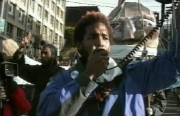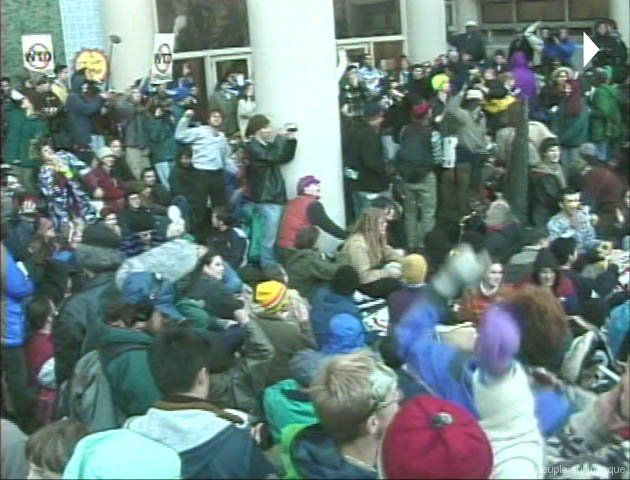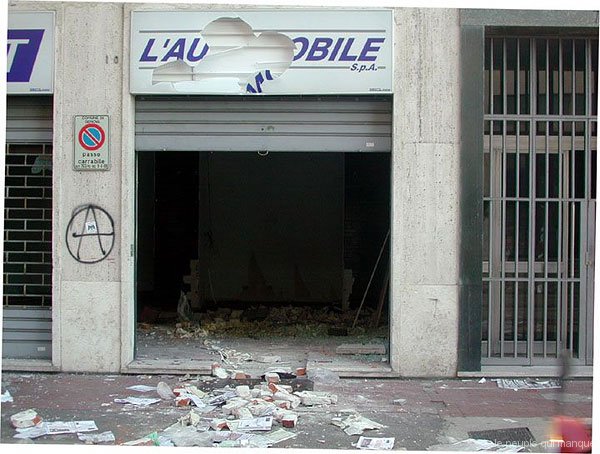Reclaim the streets !
Friday, December 5, 2008 – 8:30pm
Maison Pop’ de Montreuil
Free admission
In the presence of Olivier Blondeau and Laurence Allard (authors of Devenir média)
With the cry of Reclaim the streets! we’ll take a look at the strategies of urban reappropriation, of our lives, of our cities, implemented by contemporary anti-globalization movements. Stemming from an activism of the multitudes, ecology, anti-capitalism and the invention of radical democracies, these movements are rooted in an “imaginary of rupture”.
They are also at the origin of a contentious use of the media, an exciting practice of collaborative, mobile, decentralized counter-information, reformulated from the minority positions of media-activists.
The films presented here are the result of two approaches: one by the Indymedia network of media-activists, and the other by the Bernadette Corporation collective of visual artists.
by Jill Freidberg et Rick Rowley
filmed by over 100 media activists (68’, 2000)
 This Is What Democracy Looks like, an account of events in Seattle in 1999, during the protests against the WTO.
This Is What Democracy Looks like, an account of events in Seattle in 1999, during the protests against the WTO.A captivating implementation of a counter-informative image factory, the film captures the raw energy of the protests, the vibrant and powerful life of the anti-globalization multitude, the unity and multiplicity of demands, the alliance between activists from southern countries and local activists, and the historical resonance of the event.
It also retraces a moment of reappropriation of the city in the face of police repression and a democracy that is losing its mask.
With more cameras in the streets than any other media outlet, the Independent Media Center (IMC) coordinated over a hundred media activists and collected over 300 hours of rushes. Co-produced by IMC and Big Noise Films, this film cuts through the confusion to offer a searing portrait of the week that gave birth to a global civil movement.
This Is What Democracy Looks Like captures the plurality of images shot by these media activists, most of whom had been working for years in independent media, who met in Seattle at the end of 1999, working to create Indymedia. It can serve as a model for thinking about the experience of alternative media and their cooperative practices of collective, autonomous creation. They embrace Jello Biafra’s motto “Don’t hate the media, become the media!”, which is the motto of the Tactical Media activism born in the 90s.
Get Rid of Yourself
by Bernadette Corporation (2003, 60′)
with Chloé Sévigny and Werner Von Delmont
Built around the events of the G8 summit and its protest in Genoa in July 2001, Get Rid of Yourself focuses on the experiences and reflections of the autonomous movements and “black block” groups in particular, which emerged in Germany in the 1980s. It attempts to link militant political practice to an experience of life in general. From a post-situationist perspective, the destruction (looting supermarkets, ransacking banks) and occupation of the streets open up liberated zones within the metropolis.
Using voice-over testimonies, Bernadette Corporation chooses to use an aesthetic of mixing to recreate the intensity and conflict of sensations, the quest for chaos and the post-modern anxiety of the post-9/11 permanent war. “Twenty years. Twenty years of counter-revolution. Preventive counter-revolution. In Italy and elsewhere. Twenty years of a sleep bristling with fences, populated by vigilantes. A sleep of bodies, imposed by curfew. Twenty years. The past does not pass. Because the war goes on. Extending, branching out. In an unprecedented calibration of subjectivities.”
1 Reclaim the streets, named after the British direct action groups who, since 1994, have been organizing street parties that are part revolutionary carnival, part direct action, part insurrectionary, Dionysian reappropriation of public spaces.
Texts & curating : Kantuta Quiros & Aliocha Imhoff

